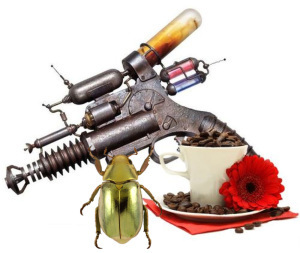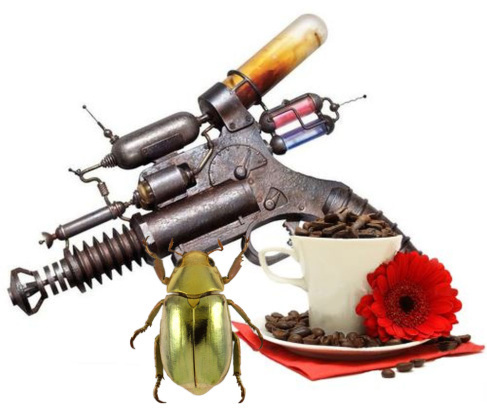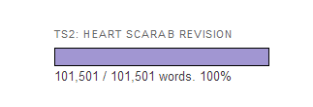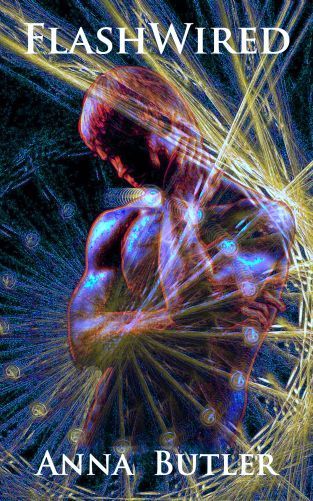Anna Butler's Blog, page 45
November 14, 2013
Writing as organic growth – or dammit, I *liked* those bits…
No, not quite like a mushroom, although there is a sense of tendrils creeping all over the place, like mycelium, that may one day produce a fruiting body that is your novel.
I was really thinking of the pros and cons of outlining/planning vs seats of the pants writing, and how with the best will in the world, your outline will get hijacked by something that grows organically as you’re writing. The Gilded Scarab, the current WIP, is a case in point. When I started out to rewrite the coffee shop novella into a full novel, I had pretty good idea where it was going to go. From being a 20K word story set almost exclusively in a coffeeshop near the British Museum, it’s now planned to be a steampunk, turn of the 20th century Egyptian (well, Aegyptian. See ‘steampunk’, above, for my excuse for youneek spelling) mystery romance.
The reasoning went thus: the coffee shop romance made a reasonable novella but (i) modern day coffee shop romances yawn yawn done to death yawn yawn and (ii) there was not enough plot there to expand it into a novel. Not even a short novel. So, I took the job of the hero (archaeologist and curator at the Museum) and expanded the story outline to encompass scenes in Egypt where there’s a mystery/murder/mayhem theme and involve the hero’s love interest (ex pilot, now coffee shop owner) to pile on the drama and maybe even a little bit of angst.
Then: “Oh,” said my brain, “remember how much you’ve always liked the thought of writing a steampunk novel where you can have fun with aeroships and luminferous aether? Here’s your chance. Set it in 1900 or thereabouts, in a Britain ruled not by an elected government, but by a convocation of oligarchs – the Convocation Houses – so you can mix in steam and ray guns with House politics and jockeying for power. Make your hero a reluctant player in all that politics and wot larks you can have!”
All cool so far, right? Yup. I thought so, too.
Then I came to realise that the hero’s backstory in the novella just wouldn’t work in the expanded novel. In the novella, I dealt with Ned’s first lover (also an archaeologist at the museum) and his short lived marriage (wife killed in an accident leaving him with her son to bring up) in a couple of pages. Neither were really important to what little plot there was except (i) in Daniel’s case, be a wonderful excuse for Rafe, the coffee shop owner, to say the words “pumpkin spiced double-shot dry latte with an extra pump of sugar-free vanilla and chocolate sprinkles” without dying of terminal shame at how ridiculous that is, and (ii) in Laetitia’s case, to provide Ned with a stepson so that he and Rafe could have the requisite ready-made family that m/m romance readers love.
But being so cursory and cavalier just won’t work now. The Aegyptian element of it is still a bit unformed, but will certainly involve the Gilded Scarab of the title. It’s important that Rafe is there with him, and it’s important that Daniel is too. So Daniel has to be a full, rounded character with a personality of his own and can no longer be introduced and dismissed in a couple of skimpy paragraphs. I’m in the process of writing all this now and as of today, I am 16,000 words in and Daniel and Ned have just had sex for the first time. I still have to bring their affair to an end and marry Ned off to Laetitia, who can no longer be a single mother whose child Ned adopts, but must (for reasons of House politics and Ned needing a legitimate heir) be the mother of Ned’s two sons, Harry and Jack, before I kill her off in her accident. At this rate, Rafe isn’t even going to make an appearance until about chapter 8 and possibly another 10,000 words.
Which brings me to the reason I’m beating my head off the proverbial brick wall.
The original novella had sections from Rafe’s PoV, that I am really, really sorry to lose. I could have expanded those beautifully to put them into the steampunk universe, and he’s a lot of fun, is Rafe, and a joy to write. But I don’t think that I can introduce a second PoV character so late in the novel, can I? Not and expect it to work. I’m already struggling with the notion that introducing the main love interest so late is problematic, without me then switching to his point of view. At least if I keep it all in Ned’s PoV throughout, it makes the story more an account of his life and therefore easier to accept that, for Ned, what happened with Daniel and Laetitia was terribly important to him in forming the man who will later meet and love Rafe. I am going to have to keep this one as a single PoV throughout, and all my lovely Rafe passages will have to be sacrificed. Colour me sad at that.
Still, I suppose that when Gilded Scarab is available, I could always do the Rafe chapters as a sort of remix free extra, couldn’t I? I quite like the possibilities of that. I could post the Rafe chapter here as a freebie as a taster of Scarab itself. That might be good.
Which long winded tale, is my way of saying that even when you do have a cunning plan, there is many a slip etc etc etc.
Or, even more concisely: DAMN.


November 12, 2013
A nice review for Happy Holidays
Another nice 4**** review over at Hearts on Fire Reviews from Lucy on 08 November:
Happy Holidays by Anna Butler –Rated 4. Loved the whole idea of Kit’s “never want it to be just ordinary for you”. Fifteen years together and he wants things to be “fun and exciting and wonderful” and then he actually goes about making that happen. Adorable.
Short, but very much appreciated!


November 1, 2013
NaNoWriMo and the Gilded Scarab
I’m not doing this formally this year – I haven’t signed up and I don’t belong to any of the support groups or virtual work camps – but I am intending to use the discipline of NaNo to break the back on the projected steampunk coffee-house Aegyptan-mystery m/m romance. I made a slow start today though. 2,285 words, or just below 5% done. Not good enough!
Anyhow, I have made a start. I’m not sure about it, but here, as a little taster, is the opening:
The first time Ned Winter saw the stone crow and visited the Britannic Imperial Museum to see the Aegyptan mummies, was the day that someone tried to assassinate his father.
It was also Ned’s eighth birthday, something that almost got forgotten in his excitement at seeing the dead bodies in the Mummy Gallery and later, as they left for home, being bundled by one of the House Gallowglass guards into the doorway of a shop on Museum Street while people shouted and ran around in the narrow street outside. Ned hadn’t been able to see very much, squashed as he was into the doorway with one of the younger guards crowding him in and blocking Ned’s view with his broad, black-clad back. He thought he saw his father, steam all around him, raising his pistol and firing it toward the Oxford Road. The pistol gave out a little flash of light, and then his father was gone again. The guard didn’t allow Ned to move, so he had to content himself with the discovery that the lintel and doorposts of the shop were carved with monkeys, snakes and birds, peeking out at him between leaves and twisty tree trunks.
He trailed his fingers briefly over the round head and down the short curved beak of one particular bird in the jumble of wildlife; a crow, terribly lifelike, head tilted, clever eyes so beautifully carved into the dirty, sooty stone that Ned could swear that it was watching him. Its beak was just agape, but before Ned could wonder if the crow would caw at him, or even speak, the guard turned swiftly, caught Ned up and threw him into the cabin of their steamcar. His father and the other guard were already there. The guard looked worried.
Ned’s father gathered Ned in as the car lurched off with a burst of vapour and the smell of tar. “Well, that was exciting. All right, Ned? Not scared?”
Ned beamed. “Weren’t the dead people in the bandages just lovely, Papa? Can we go back again soon?”


October 30, 2013
Heart Scarab… the end, at last.
It’s almost midnight, it’s still not quite the end of October, and as I hoped, I’ve finished the first revision of the second Shield book, Heart Scarab. I am so tired I can barely keep my eyes open and I definitely need chocolate. But here’s the proof:
It’s about 3000 words longer than the first draft, which puzzles me slightly. Still, we’re only about a third of the way in, in the crit group discussions, and I’m sure they’ll make me trim it back again.
Mind you, no one will like the ending and the m/m genre readers will hate it like poison.
But it’s done.
That is so satisfying.


October 18, 2013
On lasers and Sabbath-breaking
I’ve come to the conclusion that I shouldn’t be allowed to read ‘meta’ on what makes good science fiction. I’ve just read an article in SF Signal on the most overdone/useful/damaging tropes and stereotypes in SF/F. I came away from that feeling that I am writing the most unmitigated rubbish. Old fashioned science fiction that’s about humanity pitted against aliens and has spaceships and faster than light drives and young men running around with lasers is, well, old fashioned. I can tick most of their tropes with a “Yup! Got that one.” and an “Oh hey! Got that one too!” At least I can say that with a gay hero whose love interest is another man, I don’t fall into the trap set by all those hero stereotypes. He does shoot aliens though. Does that count?
Work on the revision of the second Shield book is going on apace. I’ll admit that the last couple of weeks have been difficult for various reasons – my mother appears to be trying to fit a year’s worth of hospital appointments into the shortest possible time span, for one thing – and I could procrastinate for England at the next Procrastination Olympics and beat the entire world into abject submission. Hey, I procrastinate, people, by having little brainwaves like wondering what quotes I could find on procrastination. Thomas de Quincy wins the gold medal there : “If once a man indulges himself in murder, very soon he comes to think little of robbing; and from robbing he comes next to drinking and Sabbath-breaking, and from that to incivility and procrastination.”
My favourite diversion this week has been the search for a good word count meter that I could use to keep track of progress in revising Shield 2, and next month in writing the steampunk-coffeeshop-Egyptologist romance. Silly people in my life (and I’m looking at you, husband dear) asked in wondering tones if Word had removed the word count functionality. Well, duh. Of course not. But that’s not what I’m after here. I don’t just want a cold, emotionless absolute number. What’s inspiring about that? I want something that shows my progress towards the target. Something with colour to it. Something that inches along the screen from one side to the other, the bar of colour growing ever longer as I write. Something that celebrates achievement and progress. Something that throbs with the emotion and joy of creation, that shares that with the world.
Well, look at it.
Doesn’t that just make you throb?
And yes, this entire post was another effort at putting off, for a few minutes at least, opening up the current draft and working on the next chapter.
Told you. For England.


October 6, 2013
Wonderful Review for FlashWired
I had a wonderful fillip to lift the spirits, with an amazing review by Serena Yates At Rainbow Book Reviews and Goodreads Oct 03, 13
Serena is undoubtedly one of the genre’s most respected reviewers and I was thrilled when she gave FlashWired 5 of 5 stars.
This is what Serena said in her review:
This book took my breath away. Not just because its story takes place in an interesting future, with puzzling aliens, and a real threat to the main characters’ lives and happiness, but mainly due to the ending. Man, that got me shaken up! My jaw literally dropped and I was unable to write the review right away because my emotions were all over the place. So, I took a few hours to let things settle and to decide if I liked it or not. The thing is, the story is a really good one: great science fiction combined with a deeply emotional love story. Some of it was mind-bending and gruesome, and I cannot say it was a comfortable read. But it was a great read, and, now that I have a little more perspective, the ending is actually exactly right for the story.
Cal Paxton is a man with a bit of a reputation with both women and men. He has recently seen the light, so to speak, and is madly in love with his best friend, a fellow pilot named Jeeze. They are the top scouting team, looking for new colonies for humans to settle, and work well together both on and off the job. Jeeze is recently divorced, and not so sure he’s ready for another commitment but Cal is unstoppable; he will not be deterred. There is only one problem: theirs is a dangerous job and not all aliens they encounter are friendly. And that is about all I can ay without giving too much of the story away. Let me just say that if you do go for this book, be ready for an emotional roller coaster ride, confrontation with some scary situations, and an ending that will probably leave you just a bit unsettled.If you like science fiction that challenges the way you think about the future and any aliens we may one day encounter, is you enjoy reading about tough men who love each other deeply, and if you’re looking for a read that is scary-entertaining but definitely not a typical romance story, then you will probably like this novella as much as I did.
Wow. Just… wow.


September 27, 2013
On flittermice and tempus fugit
Last night my local park held a Bat Walk. We all assembled at 7pm, just as the park closed and dusk settled in. Isn’t the light odd in the dusk, as though it’s had a bloom put on it like the bloom on a purple grape? All the colours slowly leach away until everything is grey and black. A nice time of day.
Goodness, I came over all poetic there for a moment! Back to the bats. We spent the next hour walking around between the trees, about thirty or so adults and kids, pointing bat detectors around and getting excited when the detectors started churning out flub-a-dub, flub-a-dub noises, because that meant it was one of these delightful little guys.
It was a lovely evening. I had a little trouble trying to keep my inner geek under control when I was asked if I’d like to have a go with the bat detector. I most emphatically did not squeal and anyone who says I did is lying for some nefarious reason of their own. Besides, who wouldn’t be a little delighted when they have bats flitting above them, black against a sky that was a lemony green on the horizon and dark blue above our heads?
The flub-a-dub noise means they were pipistrelle bats. They’re our commonest species, I believe and they have the most amusing name. There are lots of species of pipistrelle bats, but ours has the Latin name Pipistrellus pipistrellus. Got that? Common pipistrelle bat, aka pipistrellus pipistrellus.
Pipistrellus derives from the Italian for bat, pipistrella. The little darling fluttering around my head last night is called the common bat bat, aka bat bat.
Way to go to show redundancy in the naming department. Biologists should not be let loose to name anything. Especially something as sweet as this.
Besides, don’t you think the old names are the best? I love some of the older, arcane names for things that we just don’t use anymore, many of which have a poetry that when you hear it, fills the chest with a warmth of satisfaction and rightness. I should start a campaign to bring them back, and I’ll start with the bat. Why ‘bat’ anyway? It doesn’t really make much sense. But flittermouse? That describes them perfectly. So from now on, my little pipistrelle friends will be the common flittermouse flittermouse, aka flittermouse flittermouse.
Far more satisfactory.
We left the park at 8, by which time it was full night. It brought home to me that the nights are drawing in and that we’re on the down slope towards winter. My favourite time of year is upon us.
I walk Molly in the park every morning. Today it was cool enough to wear a sweater, and the sun is appreciably lower in the sky. The trees are starting to turn and already the greensward (another lovely old world we don’t use anymore and will die on us some day) underneath each tree is red and orange with scattered leaves. The wind blew some around us as we walked – well, as I walked and Molly pelted full-tilt backwards and forwards trying to catch squirrels. I wouldn’t say that it was raining leaves, because that would be to give the leaf fall more power and force than it merits. It was a sort of gentle drizzle, instead – oak, hornbeam, lime and chestnuts. The whole park will be the rich colours of old spices in a another two or three weeks.
The year’s wearing away fast. I’m not melancholy about it, but it’s making me think about focus and clarity, direction and a sort of sharpness. I have a lot I want to achieve by the end of this year. I have the revision of Heart Scarab to finish by the end of October, and the steampunk coffee shop novel (tentatively called The Gilded Scarab, btw) to kick into play over NaNoWriMo in November and hopefully finish by the end of the year so I can get on to the revision of the third Shield book in the New Year. And yet I spend too much time on things like tiaras and Pinterest, on not being focused and clear, and some days I am anything but sharp. Time’s getting on, and I have to stop messing around and do stuff instead of just talking about it.
Because our park is rich in the horse chestnuts, I’m already picking up conkers to bring home and fill a bowl or two to stand around the house. They remind me that tempus is fugiting as fast as it can manage it. And I’d better start running to catch up.


September 25, 2013
Penny Plain and Tuppence Coloured – or thinking about world building
I’m in the exciting planning stage for a new novel, and it’s one that isn’t set in the contemporary world, but in an alternate, steampunk Londinium of around 1900. I should really be focusing on the revision of the second Shield novel, but in between writing about Shield warriors left on nasty little planets to face up the Maess alone, I’ve been thinking about what my steampunk coffee house novel should be about, and the plot is outlining itself nicely.
But my characters aren’t really living on the historical Earth of 1900, but in a world with steam airships and guns powered by luminiferous aether, and Britain is ruled by an oligarchy of aristocratic Convocation Houses who are constantly jockeying for position. I can’t make any assumptions at all about what the reader knows about this world, because it isn’t the world we live in or for which we have a real historical memory. I have to create it and make it live and breathe. Of course, that applies to Shield too, but I’ve been writing in that universe for so long it’s become second nature to me. I’ve had to think a little harder about the steampunk novel.
George (Game of Thrones) Martin once said that when college students and hippies started hanging up Lord of the Rings posters in the 70s: “It wasn’t the book covers or some artist’s conception of Frodo that went on our walls. It was the map of Middle-earth.”
What they cared about, what touched them the most and fired their imaginations, was the gloriously detailed world Tolkien created for his characters to live in. And dear lord, didn’t Tolkien do it well? He understood so well that world-building is cataloguing that world’s history, geography, languages, religions, economy; its weather, its societies, its peoples; its plants, its animals; its power sources, its industries, what people farm and what they eat and drink. It’s about *telling details* and allowing those details to seep through naturally into the narrative, to let them sink into the background so unobtrusively that the reader doesn’t see the mechanism at work. They only see the final, polished performance.
I don’t think there’d be much disagreement with the idea that good strong characters need history, society, environment, personality, relationships, function, technology, skills, economics, position, emotions, morals, kinks and fetishes…. You name anything that defines you yourself and the characters need something like that too. You have to create a world for your characters that is as defined, as clear, as realistic, as liveable as the one you’re in. Where you set your story, will have a profound impact on the characters you’re writing about. It will shape what they do and even what language they (and you) will be using – everything from oaths to proverbs.
Places shape people. Never forget that.
Obviously, in writing something in 21st century Earth, much of that is understood by the reader without a writer having to spell it all out. But writing in a totally created world, such as my Shield novels or the AU Londinium of 1900, then yes, of course there are hangovers and crossovers from this world (how could there not be?) but I have a huge amount of freer space to work in. But that means I have to be clear about the world I’m creating—clear about history, society… etc etc and able to let those details colour my story.
Of course, you often can’t spell everything out in their entirety within a single story, but they need to be there, lurking in the background, if a story is to have any sort of verisimilitude at all. It’s little details that you slip into the narrative that show that this is a believable world.
So, here are some of the things I thought about when I first decided to take my coffee shop idea and transpose it to a different world than ours. I asked myself a few questions to help me understand my new world and decide how much is going to bleed through into descriptions of place, the characters’ behaviour and speech, and the plot.
Is this world advanced, technological, pre-technological, agrarian, hunter-gatherer, other?
What form of government does it have – democracy, theology, oligarchy, monarchy? Is the leadership elected, heredity, through clans?
What’s the social structure like? Classless? Stratified? Nobles and commons?
How are things like healthcare provided? Education? Defence? Welfare? Immigration? Employment? Transport? Housing? And all the other issues that make a group of humans a ‘society’?
What’s the religion? One or many? Do they believe in an afterlife?
What’s the attitude to women, homosexuality, sex generally, race, disability, the elderly?
What’s the legal system like? How do they deal with criminal behaviour?
Food, Customs, Folklore? Fashion and dress?
Languages? Slang, sayings, curses, colloquialisms?
Arts? Entertainment? Literature? Festivals?
History? Legends and myth?
Half way through this I wrote down ‘STEAMPUNK!!!! and ringed it in red, and that focused the questions. And a moment later the Convocation and Minor Houses were born and I had my political system written out. I have pages of notes now, and pictures and things like system diagrams that will help put the story into a real context.
Can you over do this? Hell yes. You don’t want to spend all your time on writing this stuff and never getting a word of your story down. But if you get it right, you can see just how rich this can be and how it can add such depth to your characters and your writing that your reader will find themselves submerged and, most of all, engaged.
Samuel Taylor Coleridge, the English poet, coined the phrase “willing suspension of disbelief” back in 1817. A lot of writers think that if they get their readers to suspend their disbelief, then they’ve done a good job. I agree. But I don’t think it’s quite good enough. I don’t want to write a world so convincing that I get the reader to suspend disbelief. I want to write a world so convincing that my readers *believe in it*.
There’s a difference. It’s the difference between penny plain and tuppence coloured. Same material, only one version is brighter and shinier.
And that takes some work.
Just as well it’s fun, too.


September 20, 2013
TITLES competition – with prizes!!
The work I’ve been doing to prepare for writing the steampunk coffee-shop romance – and do I love those words in that order! – has crystallised for me a habit that I really should try and break.
I’m quite a visual person, you see. I’ve always found when I start to write something, that having lots of relevant pictures helps me ‘see’ my story playing out. When it’s fanfic, then that goes a step further and before I set finger to keyboard to write the story, I make the header banner for my fanfic website. I love doing it and it’s an integral part of how I approach writing: get the title fixed in my head and make the image header to go with it. Then really start writing.
Did you notice that I slipped a little something in there? Get the title fixed, I said. And therein lies the reason for this post.
I do fix the title for a story early in the process. I usually know what the story’s going to be about, broadly. So a story set in Lancaster’s coffee shop just down the street from the British Museum? Easy. Google is our friend here, for lots of quotes and sayings about coffee that might inspire a title. I ended up with two that I liked:
Suave molecules of Mocha stir up your blood… ( Charles Maurice de Talleyrand-Périgord)
and
Coffee is the best thing to douse the sunrise with. ( Drew Sirtors)
Cool. Suave Molecules became the working title, with Dousing the Sunrise as a potential back up.
Problem then is that I sighed and flounced and generally kicked about my study in a fit of creative angst (duh!). I don’t want to write a contemporary male/male romance set in a coffee house. Hell, how often has that been done? Done to death, most likely. The coffee’s well cold on that one.
Then came the next layer of complexity. I like the steampunk aesthetic, you see, and the idea of building a world that is recognisable, because it’s like our history and looks a little bit like the London of 1890, but is essentially very different in the way society works… oh yes. That appealed. And so Lancasters travelled back 130 years and the modern coffee shop romance became the steampunk coffee house romance. Still the same two heroes, still the same general background for each of them (egyptologist from the museum and ex-pilot who now owns the coffee house), but now they’ll be wearing cravats and top hats rather than jeans and tee shirt. I had loadsa fun creating images of coffee cups and steampunk pistols.
At first I thought I could still use Suave Molecules as the title – it has a steampunky feel, don’t you think? But no. The Muse had me wandering around the study still, clutching my brow and generally acting phrenetic (to use the steampunk spelling) and dissatisfied with myself. It wasn’t *enough*. What may have worked for a contemporary romance, a fairly sedentary story that could have been subtitled “Scenes From A Life Spent In A Coffee Shop”, just isn’t adventurous enough for steampunk. It needs more than two gentlemen in greatcoats drinking their coffee from steam-powered coffee machines (with built in furnaces and a clockwork barista).
So now half of the book will be an adventure in Aegypt, with Hero 1 going out for the winter’s excavation season and Hero 2 going with him. There will be shenanigans with sabotage and Anubis-headed jackal men in the desert, and romantic drifting down the Nile on a felucca. And I love it. I love the entire idea that my little contemporary coffeeshop idea has spread its mechanical wings and flown and is transmogrifying into something bigger and better.
The only trouble is that the title isn’t growing with it. I have never been in this position before, but *I can’t think of a title*. And that’s where the bad habit comes in. Not knowing what to call the new story means that I feel terribly inhibited about starting to write it. I am *stumped*.
So here’s your task, if you’re prepared to take it on. These are the parameters :
Steampunk setting in 1890s.
Male/Male romance
Egyptian adventure fossicking around archaeological digs – tombs!
Mummies! Scarab beetles!
A coffee shop near the British Museum
Any ideas for a title? I don’t promise to use it, but whichever idea most tickles my fancy, so to speak, will win you an ebook of FlashWired and a signed print copy of the latest Cuddling anthology from Dreamspinner. Comment here with your title ideas and your email addy to win.
Help me, Obi Wan Kenobi. You are my only hope. Help break the title deadlock!


September 16, 2013
Suave Molecules

Procrastination, thy name is “play with Photoshop”. I really should be writing the *current* WIP not creating pretty pictures to inspire me for the next one!
















